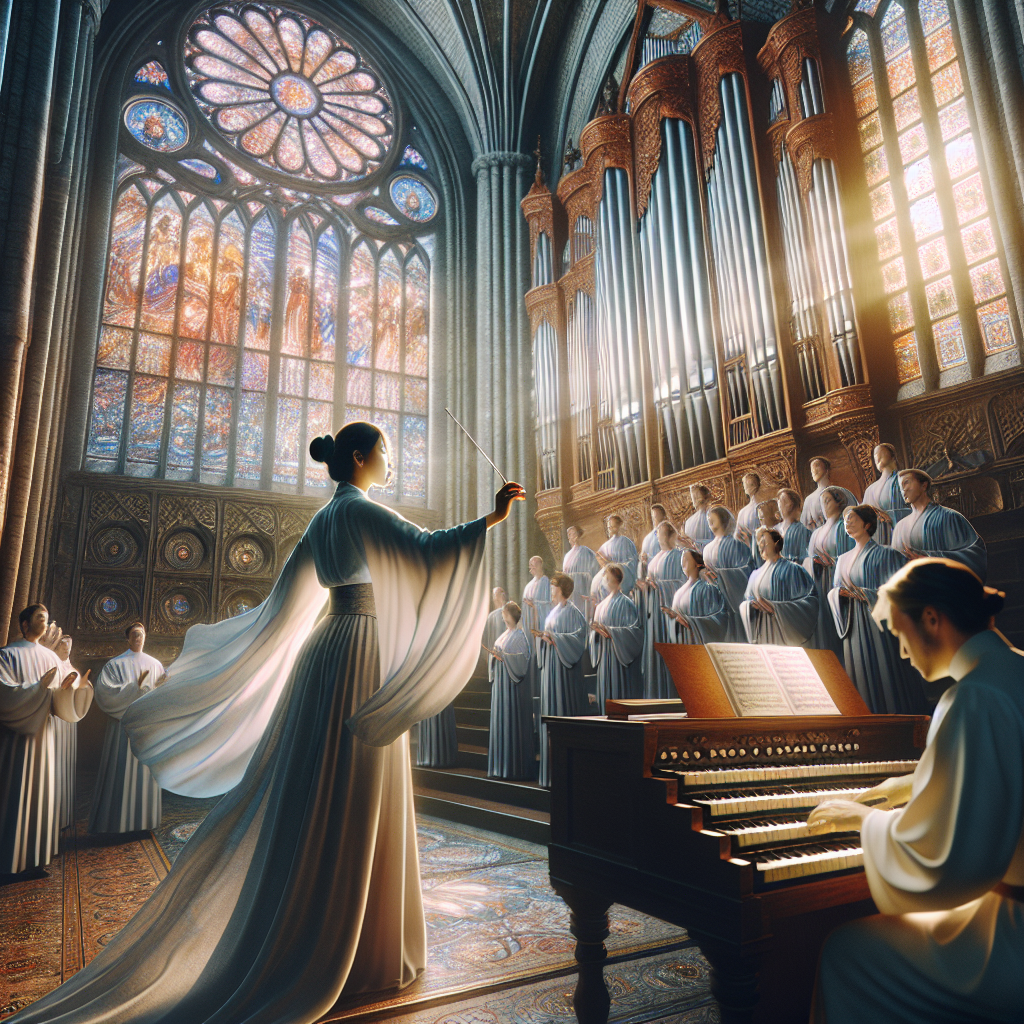Spiritual Devotional about Sacred Music
Title: The Divine Symphony: Embracing the Power and Beauty of Sacred Music
Greetings, beloved!
Have you ever felt the transformative power of sacred music wash over you, lifting your spirit as though you were being carried on the wings of angels? Whether it’s the soul-stirring chords of “Amazing Grace,” the heavenly harmonies in a church choir, or the serene notes of a Gregorian chant, sacred music has an unparalleled ability to touch our hearts and draw us closer to God.
In the Bible, the significance of music is woven throughout the scriptures, illustrating its divine purpose and power. One of the most beautiful examples comes from the Psalms, which are essentially ancient hymns and songs. King David, often credited with writing many of the Psalms, used music to honor and worship God, saying, “Sing to the Lord a new song; sing to the Lord, all the earth” (Psalm 96:1). This proclamation beckons us to lift our voices in worship, using music as an offering to the Lord.
Music can go beyond words; it speaks to the soul. It is no wonder that God has used this medium to communicate His love and majesty throughout the ages. Consider the story of Paul and Silas, who, even while imprisoned, sang hymns to God (Acts 16:25). Their praises transcended the chains and walls around them, eventually leading to their miraculous release. This moving testament reminds us that no matter our circumstances, sacred music can elevate our spirits and bring about divine interventions.
Incorporating sacred music into our daily lives creates a rhythm of worship that aligns our hearts with God’s will. Here are some practical ways to embrace the beauty of sacred music:
-
Create a Worship Playlist: Whether it’s contemporary Christian music, traditional hymns, or instrumental worship, assemble a playlist that resonates with you. Play it during your quiet time, while driving, or even as background music throughout your day. Let these melodies be a reminder of God’s perpetual presence.
-
Sing Along: Don’t be shy! Whether you have the voice of an opera singer or just a joyful noise, lift your voice in song. Singing engages not just our minds but our whole being, making our worship a holistic experience. Remember, God delights in your heartfelt praise.
-
Join a Choir or Worship Team: If you love to sing or play an instrument, consider joining your church’s choir or worship team. Sharing in the creation of sacred music with others can deepen your sense of connection to your faith community and enhance your worship experience.
-
Attend Worship Services: Participating in corporate worship allows you to experience the collective power of sacred music. The shared experience of singing and listening together amplifies the impact, fostering a sense of unity and divine presence.
-
Reflect on Lyrics: Often, the words of sacred songs are inspired by scripture. Meditate on the lyrics and explore the biblical passages they reference. This can provide a deeper understanding and appreciation of both the music and God’s Word.
Sacred music is more than just a form of artistic expression; it’s a bridge between the earthly and the divine. It has the power to comfort, inspire, and bring us closer to our Creator. As Ephesians 5:19-20 encourages us, “Speak to one another with psalms, hymns, and spiritual songs. Sing and make music in your heart to the Lord, always giving thanks to God the Father for everything, in the name of our Lord Jesus Christ.”
Let us cherish the gift of sacred music and use it to glorify God, uplift our spirits, and share His love with the world. Embrace the divine symphony that God has composed just for us, and let it resonate in every facet of your life.
Stay blessed and keep singing,
[Your Name]
Explore and dig up answers yourself with our BGodInspired Bible Tools! Be careful – each interaction is like a new treasure hunt… you can get lost for hours 🙂
Q&A about Sacred Music
Sure, here is a Q&A format focused on Sacred Music:
Q: What is sacred music?
A: Sacred music refers to compositions that are created for religious or worship purposes. This genre encompasses a variety of music styles that are used in spiritual settings across different cultures and religions.
Q: What are some of the primary characteristics of sacred music?
A: Sacred music often features elements such as reverence, solemnity, and a sense of the divine. It may incorporate texts from religious scriptures, liturgy, and prayers. Instrumentation and vocal arrangements can vary greatly but often emphasize harmony and a contemplative mood.
Q: Can you name some famous composers of sacred music?
A: Notable composers of sacred music include Johann Sebastian Bach, Wolfgang Amadeus Mozart, Antonio Vivaldi, and Giovanni Pierluigi da Palestrina. Bach’s "Mass in B Minor" and Mozart’s "Requiem" are examples of famous sacred works.
Q: What is Gregorian Chant?
A: Gregorian Chant is a form of plainchant that originated in the Roman Catholic Church during the Medieval period. It features monophonic, unaccompanied vocal music, and is named after Pope Gregory I. Gregorian Chants are typically sung in Latin and have a meditative, ethereal quality.
Q: How does sacred music differ between religions?
A: Different religions have unique sacred music traditions. For instance, Christian sacred music includes hymns, psalms, and masses, while Islamic sacred music might include the call to prayer and other non-musical vocalizations as instruments are generally considered inappropriate for worship. Hindu sacred music might involve bhajans, kirtans, and ragas, which feature elaborate melodic and rhythmic structures.
Q: What is the role of sacred music in worship services?
A: Sacred music plays a significant role in worship services by enhancing the spiritual experience, creating a sense of communal identity, and helping to convey religious teachings and emotions. It often accompanies rituals, ceremonies, and acts as a medium for prayer and meditation.
Q: Are there any contemporary forms of sacred music?
A: Yes, contemporary forms of sacred music include modern hymns, Gospel music, contemporary Christian music (CCM), and new compositions for religious services that might incorporate various musical styles, including pop, rock, and jazz, adapted to fit the worship context.
Q: What is the significance of the organ in sacred music?
A: The organ has a long history in Christian sacred music, particularly in Catholic and Protestant traditions. It is often used to accompany congregational singing, create atmospheres for meditation and worship, and perform preludes, postludes, and offertories. The instrument’s powerful and diverse timbres make it well-suited for the grandeur and solemnity of worship services.
Feel free to ask more questions or dive deeper into specific areas of sacred music!


